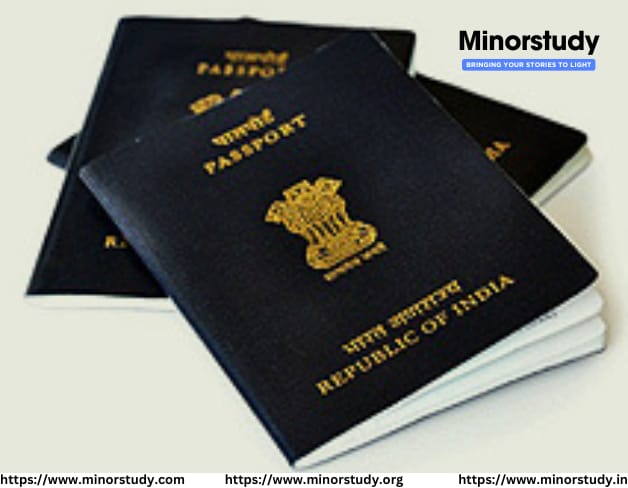🛂 7 Powerful Reasons Why the Passport is Your Most Vital Travel Document – Must-Read!
🌍 Introduction: More Than Just a Booklet
A passport may appear to be a simple booklet, often tucked away in drawers and wallets until needed. But it is far more than that. It’s your gateway to the world, a proof of identity, and a silent narrator of global history and geopolitics. In today’s globally connected world, owning a passport isn’t just a luxury—it’s a necessity for international mobility, legal identity, and personal growth.
- 🌍 Introduction: More Than Just a Booklet
- 📜 History of the Passport: An Ancient Yet Evolving Concept
- 📚 Fascinating Passport Facts You Didn’t Know
- 📅 Timeline of Passport Development
- ❓ FAQs About Passports – Clear Your Doubts
- Q1: What is the main purpose of a passport?
- Q2: How long is a passport valid?
- Q3: Can I have more than one passport?
- Q4: What happens if I lose my passport abroad?
- Q5: Are all passports biometric today?
- Q6: Can a country refuse to issue a passport?
- 🧠 Significance of a Passport in Modern Society
- 1. Gateway to Global Mobility
- 2. National Identity
- 3. Security and Regulation
- 4. Economic & Professional Opportunities
- 5. Social Empowerment
- 🙏 Observance and Cultural Relevance
- 💌 Wishing Someone for Passport-Related Success
- 🔍 Important Points to Remember
- ❤️ Why It Matters in Our Life and Society
- 🧭 Conclusion: A Symbol of Identity, Hope & Opportunity
In this in-depth article, we will explore the history, facts, frequently asked questions (FAQs), timeline, significance, observance, and daily life impact of passports in our society, with a human-friendly touch and over 1200+ words of engaging, SEO-optimized content.
📜 History of the Passport: An Ancient Yet Evolving Concept
The concept of the passport is ancient. Surprisingly, it finds its first known mention in the Bible, in the Book of Nehemiah (circa 450 BC). Nehemiah, an official serving under the Persian king Artaxerxes, requested a letter of safe conduct for his journey to Judah—essentially, an early form of a modern passport.
Key Historical Milestones:
Middle Ages: Kings and emperors issued travel documents known as “safe conducts” for diplomats and trusted merchants.
15th Century (France & England): Monarchs issued written orders allowing subjects to travel abroad.
19th Century: With the invention of the railway, passport usage declined in Europe due to ease of movement.
World War I: Passports became mandatory again for security and identification.
1920: The League of Nations standardized passports post-WWI to restore order.
Modern Era: Machine-readable passports emerged in the 1980s, followed by biometric passports in the 2000s.
📚 Fascinating Passport Facts You Didn’t Know
Most Powerful Passport (2025): Japan, Singapore, and Germany lead the world in travel freedom.
Least Powerful Passport: Afghanistan ranks the lowest, allowing entry to only about 28 countries without a visa.
Color Code: Passport covers are often red, blue, green, or black, each with symbolic and political meanings.
Diplomatic Passports: Issued to government officials and diplomats, offering privileges abroad.
Emergency Passports: Temporary documents issued to citizens who lose their passport overseas.
Vatican Passport: The world’s smallest country issues one of the rarest passports, primarily to clergy.
Passports With Chips: Modern passports contain RFID chips with biometric data for enhanced security.
📅 Timeline of Passport Development
| Year | Event |
|---|---|
| 450 BC | First recorded mention in the Bible |
| 1414 | England begins issuing travel letters under King Henry V |
| 1540 | France introduces centralized passport control |
| 1914 | World War I makes passports mandatory |
| 1920 | League of Nations formalizes passport structure |
| 1980s | Machine-readable passports introduced |
| 2000s | Biometric e-passports become common |
| 2020s | Digital ID and mobile passport tech under development |
❓ FAQs About Passports – Clear Your Doubts
Q1: What is the main purpose of a passport?
A: It verifies your citizenship and identity while allowing you to travel internationally.
Q2: How long is a passport valid?
A: Typically 10 years for adults and 5 years for minors, depending on the issuing country.
Q3: Can I have more than one passport?
A: Some countries allow dual or multiple citizenships, hence multiple passports.
Q4: What happens if I lose my passport abroad?
A: Visit the nearest embassy or consulate for an emergency travel document.
Q5: Are all passports biometric today?
A: Most modern passports now include biometric features for security and identity verification.
Q6: Can a country refuse to issue a passport?
A: Yes. If you have legal restrictions (e.g., criminal charges, unpaid child support), it can be denied.
🧠 Significance of a Passport in Modern Society
1. Gateway to Global Mobility
The passport is your legal ticket to explore new cultures, study abroad, work in foreign lands, or seek refuge from oppression.
2. National Identity
It signifies citizenship and allegiance to a nation. It’s a document that vouches for you internationally.
3. Security and Regulation
Passports play a pivotal role in controlling international crime, illegal immigration, and ensuring lawful travel.
4. Economic & Professional Opportunities
From higher education in the U.S. to job offers in Europe or migration to Australia, a passport is essential.
5. Social Empowerment
It symbolizes freedom, status, and privilege, particularly in nations where passport access is restricted.
🙏 Observance and Cultural Relevance
Though there is no official “Passport Day”, many countries use National Passport Awareness Month (such as September in the U.S.) to educate people about travel, security, and identity.
Culturally, the passport is also seen in films, literature, and art—often symbolizing freedom, escape, or secrecy. Think of Jason Bourne’s stack of fake passports or the desperation of refugees who lost theirs.
💌 Wishing Someone for Passport-Related Success
If someone is applying for or receiving their passport, here are some human-centric ways to wish them:
“Wishing you endless adventures and safe travels as you step into the world with your new passport!”
“May your passport bring you closer to your dreams and farther from your limits.”
“Congratulations! Your passport is your new partner-in-adventure!”
🔍 Important Points to Remember
Always renew your passport well before it expires.
Check visa requirements before traveling to a foreign country.
Keep both physical and digital copies of your passport when traveling.
Report loss/theft immediately to authorities and embassies.
Never tamper with or laminate your passport—it could invalidate it.
❤️ Why It Matters in Our Life and Society
The passport may be small in size, but its impact is monumental:
➤ On an Individual Level:
Encourages education, career, and travel opportunities
Boosts self-confidence and world awareness
Empowers global citizenship
➤ In Society:
Strengthens diplomatic relations and international cooperation
Helps monitor global migration patterns
Facilitates peacekeeping, aid, and asylum processes
🧭 Conclusion: A Symbol of Identity, Hope & Opportunity
In a world that’s increasingly interconnected, the passport is no longer just a document—it’s a declaration of identity, opportunity, and intent. Whether you dream of sipping coffee in Paris, studying in Canada, or starting a business in Dubai, your journey begins with a passport.
It’s a silent yet powerful testament to human curiosity, courage, and the universal desire to explore beyond borders.








